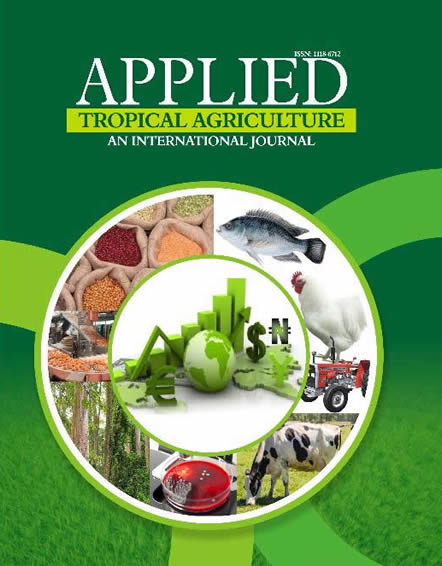The article used a profit choice model based on the link between conditions of climate and livestock choice to infer the
adaptive behavior of human systems at a micro scale. The marginal effect of climate change on the livestock choice of rural
households was estimated using multivariate probit specification and executed in STATA package. Projected probability
impact of climate change in 2030 and 2050 was estimated using climate change forecasts from the Intergovernmental
Panel on Climate Change (IPCC). Results revealed a unit change in baseline temperature brought about a fall in the
probability of choosing dairy cattle (-62.9%) while it increased the probability of choosing Beef cattle (22.6%), small
ruminant (0.1%) and Poultry (36.1%). Also a unit change in baseline precipitation reduced the probability of choosing
small ruminants (0.01%) and increases the probability of choosing Dairy cattle (0.2%), beef cattle (0.6%) and poultry
(0.6%). The projected percentage change in the probability of livestock choice revealed that by 2030, a unit change in
temperature will bring about a fall in the choice for small ruminants, dairy, poultry and beef livestock by 11.6%, 6.1%,
6.0% and 5.9% respectively. However, by 2050, relative to other livestock types, the probability of choosing small ruminant
will reduce by 67% with a unit change in temperature. Precipitation however increased the probability of choosing dairy
animal in 2030 and 2050 by 5.3% and 6.7% respectively. Controlling for non-climate factors, the study showed that as
climate changes, farmers will substitute livestock types that are beneficial and profitable as an adaptation strategy. Hence
the need to embark on livestock improvement programme on specific livestock and farm management practices that can
foster the resilience of livestock types to adverse climatic conditions.
Key words: Estimating, Global climate change, Livestock choice, Rural Households, Nigeria
PAPER TITLE :ESTIMATING THE OPTIMAL LIVESTOCK CHOICE OF RURAL HOUSEHOLDS UNDER CONDITIONS OF CLIMATE CHANGE FOR NIGERIA
APPLIED TROPICAL AGRICULTURE | VOLUME 22 NUMBER 1 2017
Paper Details
- Author(s) : Odozi, J.C.and Ashagidigbi, W.M.
- Abstract:


